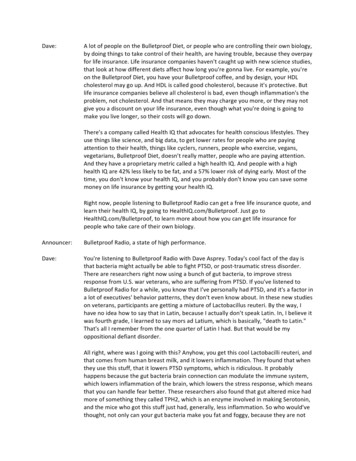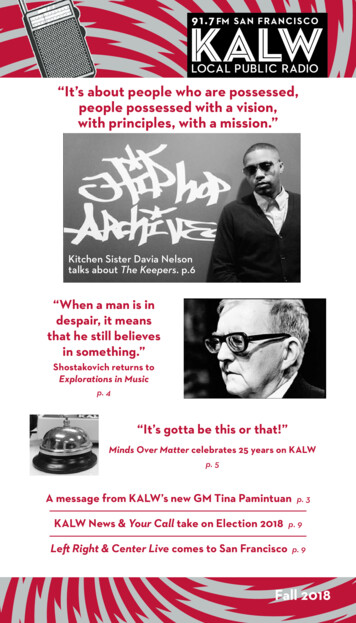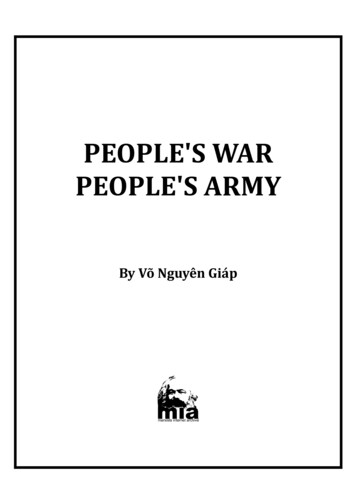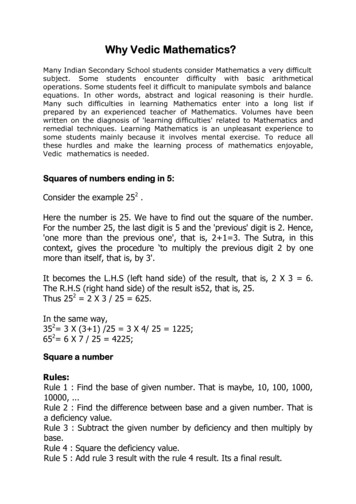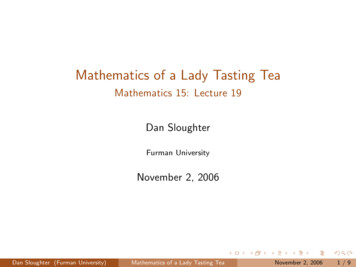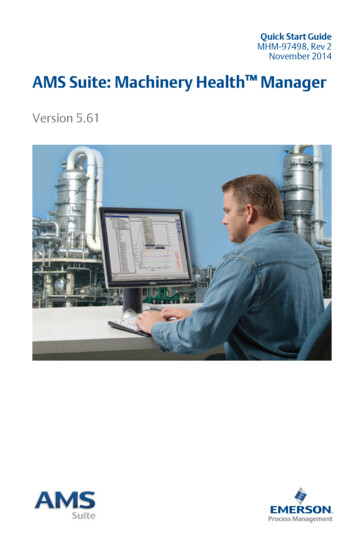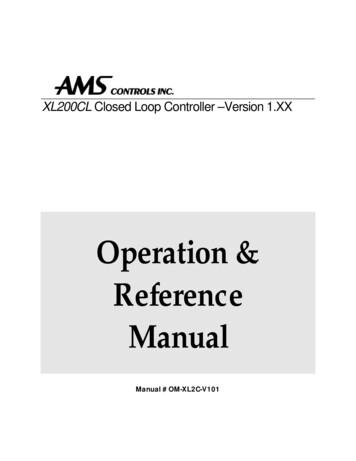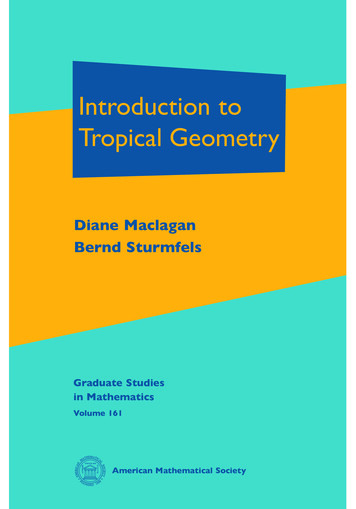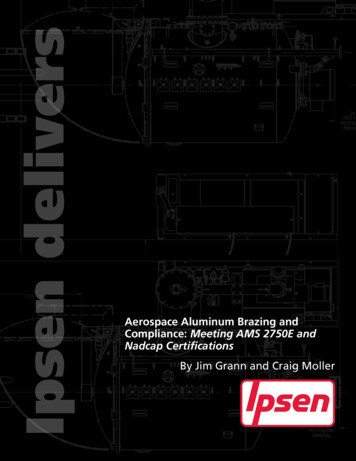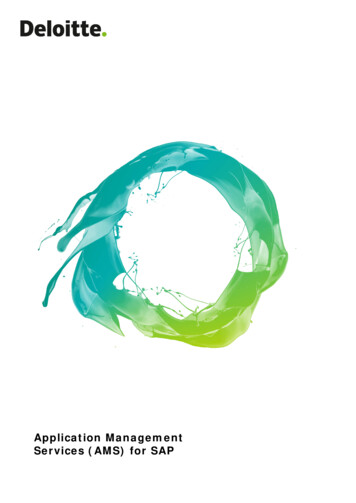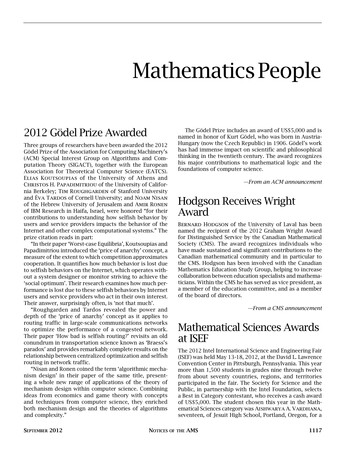
Transcription
Mathematics People2012 Gödel Prize AwardedThree groups of researchers have been awarded the 2012Gödel Prize of the Association for Computing Machinery’s(ACM) Special Interest Group on Algorithms and Computation Theory (SIGACT), together with the EuropeanAssociation for Theoretical Computer Science (EATCS).Elias Koutsoupias of the University of Athens andChristos H. Papadimitriou of the University of California Berkeley; Tim Roughgarden of Stanford Universityand Éva Tardos of Cornell University; and Noam Nisanof the Hebrew University of Jerusalem and Amir Ronenof IBM Research in Haifa, Israel, were honored “for theircontributions to understanding how selfish behavior byusers and service providers impacts the behavior of theInternet and other complex computational systems.” Theprize citation reads in part:“In their paper ‘Worst-case Equilibria’, Koutsoupias andPapadimitriou introduced the ‘price of anarchy’ concept, ameasure of the extent to which competition approximatescooperation. It quantifies how much behavior is lost dueto selfish behaviors on the Internet, which operates without a system designer or monitor striving to achieve the‘social optimum’. Their research examines how much performance is lost due to these selfish behaviors by Internetusers and service providers who act in their own interest.Their answer, surprisingly often, is ‘not that much’.“Roughgarden and Tardos revealed the power anddepth of the ‘price of anarchy’ concept as it applies torouting traffic in large-scale communications networksto optimize the performance of a congested network.Their paper ‘How bad is selfish routing?’ revisits an oldconundrum in transportation science known as ‘Braess’sparadox’ and provides remarkably complete results on therelationship between centralized optimization and selfishrouting in network traffic.“Nisan and Ronen coined the term ‘algorithmic mechanism design’ in their paper of the same title, presenting a whole new range of applications of the theory ofmechanism design within computer science. Combiningideas from economics and game theory with conceptsand techniques from computer science, they enrichedboth mechanism design and the theories of algorithmsand complexity.”SEPTEMBER 2012NOTICESThe Gödel Prize includes an award of US 5,000 and isnamed in honor of Kurt Gödel, who was born in AustriaHungary (now the Czech Republic) in 1906. Gödel’s workhas had immense impact on scientific and philosophicalthinking in the twentieth century. The award recognizeshis major contributions to mathematical logic and thefoundations of computer science.—From an ACM announcementHodgson Receives WrightAwardBernard Hodgson of the University of Laval has beennamed the recipient of the 2012 Graham Wright Awardfor Distinguished Service by the Canadian MathematicalSociety (CMS). The award recognizes individuals whohave made sustained and significant contributions to theCanadian mathematical community and in particular tothe CMS. Hodgson has been involved with the CanadianMathematics Education Study Group, helping to increasecollaboration between education specialists and mathematicians. Within the CMS he has served as vice president, asa member of the education committee, and as a memberof the board of directors.—From a CMS announcementMathematical Sciences Awardsat ISEFThe 2012 Intel International Science and Engineering Fair(ISEF) was held May 13-18, 2012, at the David L. LawrenceConvention Center in Pittsburgh, Pennsylvania. This yearmore than 1,500 students in grades nine through twelvefrom about seventy countries, regions, and territoriesparticipated in the fair. The Society for Science and thePublic, in partnership with the Intel Foundation, selectsa Best in Category contestant, who receives a cash awardof US 5,000. The student chosen this year in the Mathematical Sciences category was Aishwarya A. Vardhana,seventeen, of Jesuit High School, Portland, Oregon, for aOF THEAMS1117
Mathematics Peopleproject titled “Small geometric progressions modulo Nfor deterministic polynomial selection”. Vardhana alsoreceived a First Award, which carries a cash prize ofUS 3,000. In addition, a grant of US 1,000 was given toJesuit High School. Other award winners and the titles oftheir projects follow.First Award: Fabian Henneke, nineteen, XianghuiZhong, eighteen, and Danial Sanusi, nineteen, all fromKippenberg-Gymnasium, Bremen, Germany, “(Almost)unit-distance points in the polychromatic plane: Coloringsof the n-dimensional space”.Second Award (US 1,500): Katherine Leigh Cordwell,sixteen, Manzano High School, Albuquerque, New Mexico,“Completing graphs”; Madhurima Das, fifteen, Plymouth High School, Canton, Michigan, “Fractal dimensionanalysis to predict cancer”; Sidharth Dhawan, eighteen,Westview High School, Portland, Oregon, “Complexity ofinterlocking polyominoes”.Third Award (US 1,000): Markus Robert Woltjer,seventeen, Wilsonville High School, Wilsonville, Oregon,“Graph theory and locality sensitive hashing for DICOMimage analysis”; Anirudh Prabhu, seventeen, West Lafayette Junior/Senior High School, West Lafayette, Indiana,“A unitary group relaxation of the traveling salesmanproblem and its applications”; Junda Huang, seventeen,James Madison High School, Brooklyn, New York, “A relationship between quadratic character and repeating decimals”; Pratheek Nagaraj, eighteen, Marjory StonemanDouglas High School, Parkland, Florida, “Novel optimizedRunge-Kutta methods to increase computational accuracyin numerical integration of differential equations”; JonahMilton Kallenbach, seventeen, Germantown Academy,Fort Washington, Pennsylvania, “Novel graph theory algorithms for protein structure prediction and design”.—From an ISEF announcementAMS Menger Awards at the2012 ISEFThe 2012 Intel International Science and Engineering Fair (ISEF) was held May 13–18, 2012, at theDavid L. Lawrence Convention Center in Pittsburgh,Pennsylvania. This year more than 1,500 students ingrades nine through twelve from about seventy countries,regions, and territories participated in the world’s largestpre-college science research competition, which was firstorganized in 1950 and has included international participants since 1958. Student finalists who compete at the ISEFgo through a multistep process to qualify and have won anall-expense-paid trip to the fair. They qualify by winninglocal, regional, and state fairs in the United States ornational science fairs abroad. In addition to numerousgrand awards presented by the ISEF, more than eightyfederal agencies, professional and educational organizations, including the American Mathematical Society (AMS),participated by giving special awards. Prizes given by theAMS included cash, certificates, AMS tote bags, and abooklet about Karl Menger given to each award winner.1118NOTICESAMS Menger Awards. Back row (l-r): Danial Sanusi,Fabian Henneke, Katherine Cordwell, ViachaslauMurshka, Greg Fasshauer (committee chair). Front row(l-r): Andrew Annis (AMS), Danila Baygushev, AnirudhPrabhu, Raman Birulia, Sidharth Dhawan.For the AMS this was the twenty-fourth year of participation, and it was the twenty-second year of the presentation of the Karl Menger Awards. The members of the 2012AMS Menger Prize Committee and AMS Special AwardsJudges were Greg Fasshauer, Illinois Institute of Technology (chair); Moon Duchin, Tufts University; and JonathanKing, University of Florida. The panel of judges initiallyreviewed all fifty-seven projects in mathematics, as well asa number of mathematically oriented projects in computerscience, physics, and engineering. From these entries theyselected a subset of students who were interviewed forfurther consideration for a Menger Prize. The AMS gaveawards to one first-place winner, two second-place winners, four third-place winners, and honorable mentionsto five others.The Karl Menger Memorial Prize winners for 2012(listed alphabetically in each category) are as follows:First-Place Award (US 1,000): Fabian Henneke, DanialSanusi, and Xianghui Zhong, Kippenberg-Gymnasium,Bremen, Germany, “(Almost) Unit-Distance Points in thePolychromatic Plane: Colorings of the N-DimensionalSpace”.Second-Place Awards (US 500): Raman A. Birulia,School No. 41, Minsk, Belarus, “The Probability of Generating the Symmetric Group with a Commutator Condition”;Katherine Leigh Cordwell, Manzano High School, Albuquerque, New Mexico, “Completing Graphs”.Third-Place Awards (US 250): Danila AlexandrovichBaygushev, Lyceum “Vtoraia shkola”, Moscow, Russia,“(C, B, A)-Permutations, Their Young Diagrams and ArnoldDiscrete Dynamic Systems”; Sidharth Dhawan, WestviewHigh School, Portland, Oregon, “Complexity of Interlocking Polyominoes”; Viachaslau I. Murashka, GymnasiumNo. 71, Gomel, Belarus, “Partially Conjugate-PermutableSubgroups and Their Applications”; Anirudh Prabhu,West Lafayette Junior/Senior High School, West Lafayette,OF THEAMSVOLUME 59, NUMBER 8
Mathematics People/Mathematics OpportunitiesIndiana, “A Unitary Group Relaxation of the TravelingSalesman Problem and Its Applications”.Honorable Mention Awards: Rashad Abdulla, WestShore Junior/Senior High School, Melbourne, Florida, “Onthe Fine Classification of Periodic Orbits of ContinuousEndomorphisms on the Real Line with Application inChaos Theory”; Frederik Benzing, Landesgymnasium fürHochbegabte, Schwäbisch Gmünd, Germany, “ContinuedFractions and e”; Mark Alan Holmstrom and TheresaMcLaughlin, Live Oak High School and Ann Sobrato HighSchool, Morgan Hill, California, “Neighbors with PrescribedPrime Factors”; Youkow Homma and Lyndon Ji, CarmelHigh School, Carmel, Indiana, “Counting Zeros of RationalHarmonic Functions: Parameter Spaces”; Anita Kummamuri Rao, Glenda Dawson High School, Pearland, Texas,“Lorenz & Modular Flows are Knot Similar”.Forty-one individual students and sixteen 2- or 3- member teams from fifteen different countries competed inthe mathematics category, with fifty-two of the participants being male and twenty-three female. As indicatedby the titles of the award-winning projects listed above,the student research covered a wide range of topics. Thepanel of judges was impressed by the quality, breadth andoriginality of the work, and the dedication and enthusiasmof the students. Many of the projects contained originalresearch one would usually expect to see only from graduate students. For the first time in recent history the MengerAward judges selected a team of students (Fabian Henneke, Danial Sanusi, and Xianghui Zhong) as recipients ofthe First Prize Award. Two more teams received HonorableMention Awards. Anirudh Prabhu (Third-Place Award) wasthe only 2012 winner who was able to repeat his successfrom 2011. This year’s youngest winner was Danila Alexandrovich Baygushev (fourteen, Third-Place Award).In an effort to promote the outreach activities of theAMS, a number of this year’s contestants were interviewed by Greg Fasshauer. These short videos, producedby Andrew Annis (AMS), can be viewed at http://www.youtube.com/amermathsoc.The Society for Science and the Public (http://www.societyforscience.org/), a nonprofit organizationbased in Washington, DC, owns and has administered theISEF since 1950. Intel became the title sponsor of ISEF in1996. The Intel ISEF is the premiere science competitionin the world and annually provides a forum for more than1,500 high school students from more than seventy countries, regions, and territories. The 2013 Intel ISEF finalswill be held May 12–17 in Phoenix, Arizona.The AMS’s participation in the Intel-ISEF is supportedin part by income from the Karl Menger Fund, which wasestablished by the family of the late Karl Menger. The income from the donation by the Menger family covers lessthan the amount of the awards. The balance, includingthe travel expenses of the judges, comes from the AMS’sgeneral fund. For more information about this programor to make contributions to this fund, contact the AMSDevelopment Office, 201 Charles Street, Providence, RI02904-2294; or send email to development@ams.org; orphone 401-455-4103.Greg Fasshauer, Professor of Applied Mathematics,Illinois Institute of TechnologyMathematics OpportunitiesAMS Travel Grants for MCA2013, August 5–9, 2013, inGuanajuato, MexicoThe American Mathematical Society has applied to theNational Science Foundation (NSF) for funds to permitpartial travel support for up to sixty U.S. mathematiciansattending the inaugural meeting of the MathematicsCongress of the Americas (MCA) that will take placeAugust 5–9, 2013, in Guanajuato, Mexico. Subject to theaward decision by the NSF, the Society is preparing toadminister the selection process.Instructions on how to apply for support are availableon the AMS website at http://www.ams.org/programs/travel-grants/mca . The application period will be September 15–October 31, 2012. This travel grants program,if funded, will be administered by the Membership andSEPTEMBER 2012NOTICESPrograms Department, AMS, 201 Charles Street, Providence, RI 02904-2294. For questions or more information,contact Steven Ferrucci at sxf@ams.org, 800-321-4267,ext. 4113, or 401-455-4113.This program is open to U.S. mathematicians (thosewho are affiliated with a U.S. institution, and applicantsmust be affiliated with a U.S. institution at the time oftravel). It is expected that this travel grant program willprovide travel support for both U.S.-based invited speakers (senior mathematicians) and early-career mathematicians. Early-career mathematicians (those within sixyears of their doctorate), women, and members of U.S.groups underrepresented in mathematics are especiallyencouraged to apply. Invited speakers from U.S. institutions to MCA 2013 should submit applications if fundingis desired.OF THEAMS1119
Mathematics OpportunitiesApplications will be evaluated by a panel of mathematical scientists under the terms of a proposal submittedto the National Science Foundation (NSF) by the Society.Should the proposal to the NSF be funded, the followingconditions will apply: mathematicians accepting grants forpartial support of the travel to MCA 2013 may not supplement them with any other NSF funds. Currently, it is theintention of the NSF’s Division of Mathematical Sciences toprovide no additional funds on its other regular researchgrants for travel to MCA in 2013. However, an individualmathematician who does not receive a travel grant may useregular NSF grant funds, subject to the usual restrictionsand prior approval requirements.All information currently available about the MCA 2013program, organization, and registration procedure is located on the MCA 2013 website: http://www.mca2013.org/.American MathematicalSociety Centennial FellowshipsInvitation for Applications for Awards for 2013–2014Deadline December 1, 2012Description: The AMS Centennial Research FellowshipProgram makes awards annually to outstanding mathematicians to help further their careers in research. Thenumber of fellowships to be awarded is small and dependson the amount of money contributed to the program.The Society supplements contributions as needed. Onefellowship will be awarded for the 2013–2014 academicyear. A list of previous fellowship winners can be foundat ards/centennial-fellow.Eligibility: The eligibility rules are as follows. The primary selection criterion for the Centennial Fellowshipis the excellence of the candidate’s research. Preferencewill be given to candidates who have not had extensivefellowship support in the past. Recipients may not holdthe Centennial Fellowship concurrently with anotherresearch fellowship such as a Sloan or NSF PostdoctoralFellowship. Under normal circumstances, the fellowshipcannot be deferred. A recipient of the fellowship shall haveheld his or her doctoral degree for at least three years andnot more than twelve years at the inception of the award(that is, received between September 1, 2001, and September 1, 2010). Applications will be accepted from thosecurrently holding a tenured, tenure-track, postdoctoral, orcomparable (at the discretion of the selection committee)position at an institution in North America. Applicationsshould include a cogent plan indicating how the fellowship will be used. The plan should include travel to at leastone other institution and should demonstrate that thefellowship will be used for more than reduction of teaching at the candidate’s home institution. The selectioncommittee will consider the plan in addition to the qualityof the candidate’s research and will try to award the fellowship to those for whom the award would make a realdifference in the development of their research careers.1120NOTICESWork in all areas of mathematics, including interdisciplinary work, is eligible.Deadline: The deadline for receipt of applications isDecember 1, 2012. The award recipient will be announcedin February 2013 or earlier if possible.Application information: Find Centennial informationand the application form via the Internet at http://www.ams.org/ams-fellowships/. For paper copies of theform, write to the Membership and Programs Department,American Mathematical Society, 201 Charles Street, Providence, RI 02904-2294; prof-serv@ams.org; 401-455-4105.—AMS announcementCall for Nominations for ClayResearch FellowshipsThe Clay Mathematics Institute (CMI) invites nominationsfor its competition for the 2013 Clay Research Fellowships.Fellows are selected for their research achievements andtheir potential to become leaders in research mathematics. All are recent Ph.D.’s, and most are selected as theycomplete their thesis work. Most recent appointees werefinishing graduate students at the time of their selection,though other mathematicians under age thirty occasionally have been appointed. Terms range from one to fiveyears, with most given in the upper range of this interval.The primary selection criteria for the Fellowship are the exceptional quality of the candidate’s research and the candidate’s promise to become a mathematical leader. Selection decisions are made by the Scientific Advisory Board.Nominations should be submitted by October 30, 2012,and should include a letter of nomination, names andcontact information for two other references, curriculumvitae, and list of publications. Nominations should be sentto to the attention of Nick Woodhouse, Office of the President, Clay Mathematics Institute, 24-29 St. Giles, OxfordOX1 3LB, U.K. Electronic nominations are also acceptedat nwoodh@maths.ox.ac.uk, copied to Naomi Kraker atkraker@maths.ox.ac.uk.Current and alumni Clay Research Fellows are Mohammed Abouzaid, Spyros Alexakis, Timothy Austin, ArturAvila, Roman Bezrukavnikov, Manjul Bhargava, DanielBiss, Alexei Borodin, Maria Chudnovsky, Ivan Corwin,Dennis Gaitsgory, Soren Galatius, Daniel Gottesman, BenGreen, Sergei Gukov, Adrian Ioana, Bo’az Klartag, ElonLindenstrauss, Ciprian Manolescu, Davesh Maulik, MaryamMirzakhani, Sophie Morel, Mircea Mustata, Sam Payne,Igor Rodnianski, Sucharit Sarkar, Peter Scholze, DavidSpeyer, Terence Tao, Jack Thorne, András Vasy, AkshayVenkatesh, Teruyoshi Yoshida, and Xinyi Yuan.—Clay Mathematics Institute announcementOF THEAMSVOLUME 59, NUMBER 8
Mathematics OpportunitiesAWM Travel Grants forWomenNews from the CIRMThe National Science Foundation (NSF) and the Association for Women in Mathematics (AWM) sponsor travelgrant programs for women mathematicians.AWM Travel Grants for Women Researchers enablewomen to attend research conferences in their fields,thereby providing scholars valuable opportunities toadvance their research activities and their visibility in theresearch community. A Mathematics Travel Grant providesfull or partial support for travel and subsistence for ameeting or conference in the grantee’s field of specialization, awarding funds of up to US 1,500 for domestic traveland US 2,000 for foreign travel.The Mathematics Education Research Travel Grantsprovide full or partial support for travel and subsistencein math/math education research for mathe
users and service providers impacts the behavior of the Internet and other complex computational systems.” The prize citation reads in part: “In their paper ‘Worst-case Equilibria’, Koutsoupias and Papadimitriou introduced the ‘price of anarchy’ concept, a measure of
